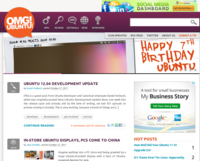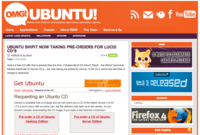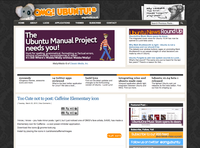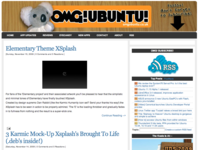Screenshot OMG! Ubuntu! October 2011
Screenshot OMG! Ubuntu! June 2010
OMG! Ubuntu! seems to be a community within a community! It has a life of its own and people often refer to it as only “OMG!”. With its popularity growing and its reputation as being the site for all things Ubuntu, I wanted to know more about the two guys behind this incredible site that has taken the Ubuntu community by storm.
Reading over the site and looking at the OMG! Ubuntu! about page there are some very impressive stats there. According to the stats page OMG! Ubuntu! has over 1.2 million unique visitors a month, 43,000 Facebook fans, 28,000 Twitter followers, and 12,000 Android app users; however, it isn’t stopping there, in fact I believe this is only the tip of the iceberg when it comes to the heights we’ll see OMG! Ubuntu! grow to.
When it comes to reporting what is happening in and around the Ubuntu community OMG! Ubuntu! reports the news as it happens, it seems like Joey and Benjamin along with other guest bloggers and writers never tire. The list of contributors to the OMG! Ubuntu! come from many areas of the community: Canonical, Debian, Zeitgeist, The Banshee Project, elementary OS, and more. As one who personally reads 100’s of feeds, mailing lists, IRC conversations and more this is no small endeavor and one OMG! Ubuntu! seems to have down to a science.
Screenshot OMG! Ubuntu! March 2010
Screenshot OMG! Ubuntu! November 2009
If you’ve ever had the opportunity to read their posts, then you’ve seen the comments that readers of OMG! Ubuntu! write and like most people who use and contribute to Ubuntu their readers are some of the most passionate out there. It was their readers that made me personally pay attention to the way I both pronounce and enunciate Ubuntu in my on camera interviews. (Thanks!)
As I mentioned earlier, you can see where their readers come from and the various ways OMG! Ubuntu! reaches and engages those readers–they make themselves available in not only one area but many. They go to where the readers are and don’t wait for the readers to come to them.
OMG! Ubuntu! works hard at supporting not only the Ubuntu community but various community projects by exposing their reader base to all the new and exciting things that are happening around them. They are open to reader feedback and suggestions and strive to give their readers the best experience possible through site content, ease of navigation, as well as a sleek look and feel that will keep their readers engaged.
Want to know more about the personalities behind this growing phenomenon known as OMG! Ubuntu? I do!
First off, Thanks Joey and Benjamin for taking time to answer my questions and letting people get to know you, your motivation and more.
Amber Graner: I believe I read that the site was started in August of 2009. What was the motivation for building the site? When did the site go from a community based Ubuntu News site to a corporate site for Ohso?
Joey-Elijah Sneddon: OMG! Ubuntu! started a bit before 2009 as a diary for me to keep a record of/track tips, tweaks, hacks and apps that I’d found so that I could come back to them at a later date. It’s been awesome to see the need for such hacks and tips diminish with each successive release of Ubuntu.
When people started commenting on posts and the RSS count started going upwards was when I realised: ‘Hold on, other folk are interested in this stuff too.’ And so OMG! Ubuntu! as most folk know it was born.
In hindsight the name “OMG! Ubuntu!” was a foolish choice: it was chosen as a satirical play on fanboism/hyperbole (a la “OMG! Ponies!”). As an Ubuntu-related site we would inevitably be accused of flagrant fanboy-ism: so the name was a play on pre-empting that.
Sadly that meaning got lost in translation leaving people to assume that the tone of the site is one of childish abandon, applauding anything Canonical or the Ubuntu community do without any kind of opinion.
Benjamin Humphrey: I’ll leave the ancient history to Joey, he knows much more than I. In a way, I think OMG! Ubuntu! is simply a filter: We take blog posts, press releases, mailing list messages, bug reports, and project announcements, and then filter them down into layman’s terms, add our own opinion, and present it in an easy and accessible fashion for interested parties to read.
AG: Were there any special licensing issues as far as the use of the Ubuntu logo and trademark you had to go through when you moved from a community site to a corporate one? If so what?
Joey: Regarding trademarks: the use of omgubuntu.co.uk was cleared with Canonical legal before everything took off.
Ohso was largely formed for tax reasons, spurred by the need to have a company VAT number in-order to publish an application [Vollybrawl] in the Ubuntu Software Centre.
Benjamin: We never really had a problem with branding or trademark issues and still do not to this day. OMG! Ubuntu! has a very strong relationship with Canonical, and I am good friends with a lot of Canonical folk outside of work as well. I think Canonical understand the importance and value that OMG! Ubuntu! brings to the Ubuntu project. I don’t think you can say that about many other tech companies, who often make life difficult for the media.
Very recently Canonical expanded their marketing/press team and we’ve been lucky to reap the benefits. For example, Oneiric was the first Ubuntu release where OMG! Ubuntu! and Canonical were in constant communication throughout the day, and could synchronise release announcements. Which meant our blog posts were up only 10 seconds after ubuntu.com “switched over”. It’s really great.
AG: What other sites does Ohso maintain besides OMG! Ubuntu!? What other projects are you involved in?
Joey: OMG! Chrome! is, indeed, very exciting for us. Ben and I are both massive users of Google services and products (from Android phones to Chromebooks) so OMG! Chrome! is a natural progression for us in terms of focus.
A number of folk from Google have been in touch to offer assistance, help and support: which has been totally amazing.
Benjamin: Currently our main focus is OMG! Ubuntu! and continuing to build our reader base and improve the experience for our community. It’s our flagship blog, and will continue to be so for some time. While we experimented with other offshoots (such as Ubuntu Gamer), we found the niche for these was just too small. We’re currently also working on OMG! Chrome! which should be launching very shortly, and that’s very exciting for us.
AG: Since starting OMG! Ubuntu! what has been your most exciting moment and why?
Joey: My personal circumstances have, thus far, prohibited me from attending any conferences in the flesh. (Which is probably for the best as I owe so many folk in the community a beer/beverage of their choosing!) so my ‘highlights’ are all of the virtual variety.
Personal highlights would include getting to speak to Mark Shuttleworth; my first Skype convo with Jono; and the sheer ‘awe’ when I first saw comments left [on the blog] by Jono [Bacon], Jorge [Castro], MPT [Matthew Paul Thomas], Alan ‘Popey’ Pope, and Neil J Patel.
Benjamin: For me personally it was the opportunity to visit Belgium for UDS-M back in May 2010. While I was there I met a lot of great people from the project. Being able to match a face and a personality to an online presence really enhances the trust within a community, and when you work so closely with these people day to day, having that trust is invaluable.
I also love conferences of all sorts – a highlight of my year is always Linux.conf.au. Certainly meeting Linus Torvalds earlier this year, and some wonderful people like the leader of the Debian project Stefano Zacchiroli, and ex-Canonical employee Jeff Waugh are memorable moments which I had the pleasure of sharing with our readers.
AG: Did you believe the popularity of the site would grow as fast as it did? You now have OMG! Ubuntu! mobile apps, you have an OMG! Ubuntu! lens, Facebook group, and merchandise in addition to the OMG! Ubuntu! site, have I missed anything? What plans are there for OMG! Ubuntu! in the future?
Joey: I knew Ubuntu was special, so manning a site dedicated to it was always going to see a bit of that ‘win’ rubbing off on us. But, that said, I remain awed and humbled by just how (comparatively) popular we are. I have to pinch myself sometimes when I see something I’ve written get 1k ‘likes’ on Facebook; or a thousand retweets or… it’s just insane. But it’s awesome because I really do believe we’re helping to spread word of Ubuntu and its awesomeness through what we’re doing.
And, at the end of the day, that’s why I sit in my chair from 9am to 11pm: to help make peoples’ use of Ubuntu as kick-ass as it can be.
As for the future: we have some tentative plans on ways we can better give back to the community – both monetarily and through focusing reader input/exposure etc.
Benjamin: I think deep down Joey and I knew we were on to a good thing, so I’m not entirely surprised it has grown as quickly as it did. 2011 has been a great year for us, and every release we’re getting larger and larger.
I think there was always a real demand for “tech speak” to be converted into something legible for the mainstream. Joey and I are the mainstream, and I think that has a lot to do with the reason we’re successful – we know exactly how to write for end users because we are end users.
We do have a lot of presence (we like to be accessible on as many platforms as possible), but there are always more plans in the pipeline. We’re working on an iPhone application, improving our mobile site, and working on a redesign for OMG! Ubuntu! based on user heatmap data we’ve been collecting.
We also have a few neat little surprise projects that are ongoing, and we’re constantly trying to improve the relationship and communication we have with our community, be it through our social media accounts, our Get Satisfaction account, or even in the comments section on the site.
AG: What was that magic moment when you knew, OMG! Ubuntu was making an impact in the Ubuntu Community? Reflecting on that moment, how has it shaped the direction of not only the site, but you personally as well?
Benjamin: Probably when real and valuable discussions began taking place in the comments, developers and designers were taking part; even Mark himself. When bugs are fixed because of an OMG! Ubuntu! article, when we get emails of thanks from small projects who have flourished thanks to our coverage, and when we have sponsored projects like Kickstarter and made it possible to buy Akshat Jain a new laptop so he could hack on projects, etc.
I think then we realized that OMG! Ubuntu! wasn’t just an add-on to the Ubuntu universe, but for a lot of people it became a real hive of activity and the first place they go when they turn on their computer in the morning. I think knowing that OMG! Ubuntu! can achieve real results that benefit Ubuntu has shaped the way we see OMG! Ubuntu!
For us it’s not just a blog anymore, it’s a living, breathing community with a soul and shape of its own which is constantly evolving as we learn our place in the community, and our readers’ desires.
AG: How many writers do you currently have finding news and posting for you on a consistent basis? How do you go about finding those contributors and guest bloggers? How should they go about that process?
Joey: So far all of our contributors have either been scouted from the comment section, or have offered their assistance directly.
We’re not averse to adding new writers, but we have to keep an eye on maintaining a degree or consistency and continuity across our postings and the best way of doing that is to not have a revolving door of contributors whose tones and intentions jar against what you’re trying to do.
That’s why the majority of our extra writers are topic-specific: Jorge and Daniel are very community developer orientated; David Nielsen sticks firmly to Banshee and Mono-related topics; Seif Lotfy only writes about Zeitgeist, etc.
Benjamin: Currently it’s basically just Joey. He’s an unstoppable, inhuman one-man writing machine. A little known fact is that he has a severe birth defect and was born with three arms, 15 fingers. Have you ever seen a picture of him below the neck? Didn’t think so.
I’ve had to cut back my hours as I’ve just accepted a position as an interface designer for a company down here in New Zealand, but I still try to handle a lot of the “backend” and community stuff when I can.
We have a number of guest writers who we let do their own thing, and a few folk from the Canonical community team like Daniel Holbach and Jorge Castro who have been invaluable at providing regular updates for our readers during the cycle. Sometimes we need to keep Jorge on a leash though otherwise he’ll get overly enthusiastic and attempt to bite visitors.
AG: Do you partner with other news sites or agencies? If so who? If not, who would you like to partner with going forward.
Joey: Does Google Reader count? 😉
No, we don’t currently partner with any other ‘site’ or agency per se – we’re helpfully kept up to date on a lot of ‘bigger’ projects – whether FOSS, Distro level, corporate level, hardware, third-party service providers etc – via a battalion of awesome PR folk who go out of their way to add us to their mail-shots or forward us important stuff.
But with OMG! Ubuntu! being a “magazine” rather than a pure-bred news-site a lot of our content is either too tailored to our readership or not relevant to others. We have been approached by a handful of the super-dupery large techsites with a view to ‘pre-empting’ them content they’d find of use, so we’ll be exploring that as we go forward but for the most part we seem to be doing well with what we’re doing – so we’ll keep on doing it.
It would be nice to get something OMG-related in print at some point, and there have been a few early discussions towards that end with a UK tech magazine regarding a small column. I’m crossing everything that something comes of it, but our focus is very much on what we’re doing now.
Benjamin: At the moment we don’t have any partners. I’m not sure we’re particularly suitable for partners. Joey and I have our own way of running the show which (in my experience) conflicts with a lot of the things other Linux publications do. I’d love to get more technical content on the site in the future, and for a while I was thinking of approaching Jonathan Corbet from Linux Weekly News after I met him at Linux.conf.au 2011 in Brisbane. But I think right now we’re pretty happy with our content balance, and the results of surveys we’ve conducted say our readers are too.
AG: You’ve expressed in the past that you believe many core Ubuntu members didn’t support OMG! Ubuntu! and the services you all are providing to the community. (I know for me personally we’ve agreed to disagree about certain topics; however, that doesn’t stop me from pointing to you all as a model of success!) When do you think this rift happened? What do you believe caused it? What would you like the Ubuntu Community to know if anything about what drives you to provide this news service for the community?
Joey: I probably haven’t helped matters myself. I’m quite a shy person who just ‘gets on with it’ – and that kind of insularity doesn’t always work to our advantage. After all, it’s hard for them to be supportive or impassioned of a project manned by someone they don’t really know, but I’m working on it – and gestures such as this interview help with this.
Benjamin: The community has always been an interesting animal to deal with, but I think on reflection some of the ‘trouble’ we got in was mostly deserved, if not entirely addressed in the right way, and we made apologies where due.
I think the rifts were caused by us being over-enthusiastic with a real “JFDI” attitude, and at points we entirely ignored the opinions of others in the community. I think we learnt valuable lessons along the way, and the ties with the community have gotten stronger as a result. I also think some members of the community may be jealous of my constantly sunny disposition, as evident in every Twitter avatar I’ve ever had. In real life I don’t smile that much, it’s just that the photographers always tape a hilarious pun just above the lens.
AG: In the 12.04 LTS release cycle where do you believe OMG! Ubuntu! and the Ubuntu community can work together and promote each other better? Where would you like to see more involvement and promotion?
Joey: I think communication and willingness is the key. We’re totally up for working together to create magic by utilising our skills and assets for the greater good. It’s probably a wee bit early to tell exactly how OMG! Ubuntu! could augment anything in the Pangolin cycle, but we’re more than game.
Benjamin: To be honest I haven’t really given it much thought. Each release we work on a promotional website or event to celebrate Ubuntu and raise awareness. I guess collaborating on that could be a great start, because man those are a lot of work. Philippe (one of our developers) and I spent 36 hours before Oneiric’s release putting the finishing touches on thenewubuntu.com.
AG: When did you first learn about Ubuntu? How soon after learning about Ubuntu did you start using it? What motivates you use Ubuntu, participate in the community and share knowledge about Ubuntu?
Joey: I first discovered ‘Linux’ at University via a feature in MicroMart magazine on the EeePC 701. I had, until that moment and for whatever reason, the notion that Linux was a “poor man’s Windows” that couldn’t really do anything. After reading the 701 article I was aghast at how wrong I’d been! I jumped over to my desk, pre-ordered an eeePC from America (with my rent money) and googled around about ‘Linux’. A compiz-cube YouTube video later I was sold.
Ubuntu 7.10 was my first release (thanks LinuxFormat). OMG! Ubuntu! (in its earliest form) started covering Ubuntu from 8.10.
Benjamin: I first started using Ubuntu around the time I got sick of Windows Vista. The taskbar would constantly “stop responding.” I figured I could probably bash my computer, but not wanting to end up in anger management classes or fork out mega bucks for a Macbook (and after all, my Toshiba was only 6 months old), I ended up trying Ubuntu 8.04.
I hated it with a passion initially. Nothing worked. My screen looked like something out of The Blairwitch Project as the graphics drivers ungracefully failed. There was a strange hissing noise coming from my webcam (how that’s even possible is beyond me), and on top of it all, the theme looked like an overused communal toilet in a mental asylum.
I uninstalled it.
It only took another week of Windows Vista before I was back, this time more determined to take the time and fix the problems myself. I joined the Ubuntu Forums, asked questions, made friends, fixed my problems, and eventually kept a record of some of the stuff I learnt. That turned into the Ubuntu Manual Project, and the rest is history.
AG: What other FOSS projects, events, or interests do you participate in besides the Ubuntu project?
Joey: I’ve a lot of respect for what the Ubuntu Women’s team have achieved and would love to see a similar initiative born for LGBT folk. I know many gay and bisexual people in the community who have to hide that aspect of themselves; essentially having to constantly editing their online lives out of fear of rejection from the overtly heterosexual-masculine clique-ness that still pervades so much of “geek culture”.
Benjamin: Apart from the Ubuntu Developer Summit, and Linux.conf.au which I get to each year, I’m also interested in PyCon New Zealand. In fact, PyCon NZ 2012 at the end of next year is to be held in my home town of Dunedin, and I have the awesome privilege of designing the conference logo.
AG: Benjamin you also lead the Ubuntu Manual Project; what was the motivation behind this project? Do you still maintain it today, or does someone else? Is it still being updated on a regular basis? Where can people find out more about this project? How can they help? How does this project differ from what the Ubuntu Docs team does? Does the manual project complement or compete with the Docs team?
Benjamin: I resigned as leader near the end of last year as I had over-committed myself greatly and became burnt out. The answers to those questions would suffice for another entire interview I’m afraid, but just quickly, the project is still being maintained by a group of volunteers who are doing a great job. You can find out more at http://ubuntu-manual.org and I’d recommend anyone wanting to contribute to check them out.
Many thanks to you both again for your time and your dedication to Ubuntu. For more information and see what these two are reporting on today check out OMG! Ubuntu!
Originally Posted here on 2011-10-27





